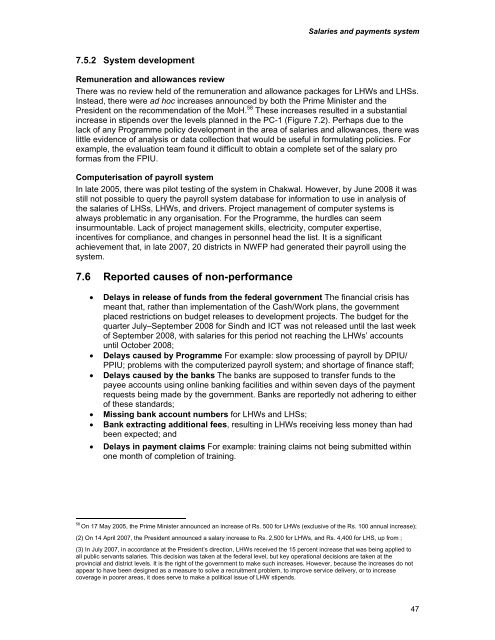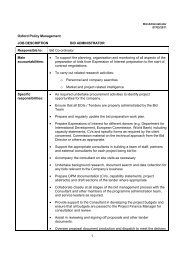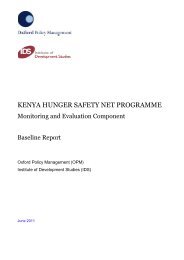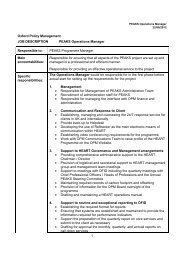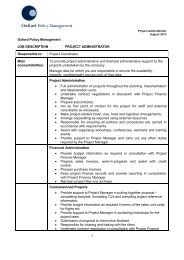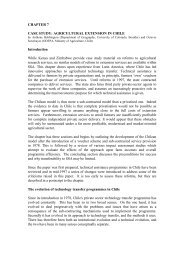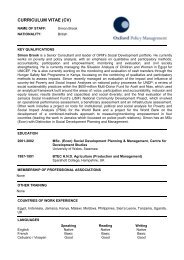LHW Systems Review - Oxford Policy Management
LHW Systems Review - Oxford Policy Management
LHW Systems Review - Oxford Policy Management
Create successful ePaper yourself
Turn your PDF publications into a flip-book with our unique Google optimized e-Paper software.
Salaries and payments system7.5.2 System developmentRemuneration and allowances reviewThere was no review held of the remuneration and allowance packages for <strong>LHW</strong>s and LHSs.Instead, there were ad hoc increases announced by both the Prime Minister and thePresident on the recommendation of the MoH. 58 These increases resulted in a substantialincrease in stipends over the levels planned in the PC-1 (Figure 7.2). Perhaps due to thelack of any Programme policy development in the area of salaries and allowances, there waslittle evidence of analysis or data collection that would be useful in formulating policies. Forexample, the evaluation team found it difficult to obtain a complete set of the salary proformas from the FPIU.Computerisation of payroll systemIn late 2005, there was pilot testing of the system in Chakwal. However, by June 2008 it wasstill not possible to query the payroll system database for information to use in analysis ofthe salaries of LHSs, <strong>LHW</strong>s, and drivers. Project management of computer systems isalways problematic in any organisation. For the Programme, the hurdles can seeminsurmountable. Lack of project management skills, electricity, computer expertise,incentives for compliance, and changes in personnel head the list. It is a significantachievement that, in late 2007, 20 districts in NWFP had generated their payroll using thesystem.7.6 Reported causes of non-performance• Delays in release of funds from the federal government The financial crisis hasmeant that, rather than implementation of the Cash/Work plans, the governmentplaced restrictions on budget releases to development projects. The budget for thequarter July–September 2008 for Sindh and ICT was not released until the last weekof September 2008, with salaries for this period not reaching the <strong>LHW</strong>s’ accountsuntil October 2008;• Delays caused by Programme For example: slow processing of payroll by DPIU/PPIU; problems with the computerized payroll system; and shortage of finance staff;• Delays caused by the banks The banks are supposed to transfer funds to thepayee accounts using online banking facilities and within seven days of the paymentrequests being made by the government. Banks are reportedly not adhering to eitherof these standards;• Missing bank account numbers for <strong>LHW</strong>s and LHSs;• Bank extracting additional fees, resulting in <strong>LHW</strong>s receiving less money than hadbeen expected; and• Delays in payment claims For example: training claims not being submitted withinone month of completion of training.58On 17 May 2005, the Prime Minister announced an increase of Rs. 500 for <strong>LHW</strong>s (exclusive of the Rs. 100 annual increase);(2) On 14 April 2007, the President announced a salary increase to Rs. 2,500 for <strong>LHW</strong>s, and Rs. 4,400 for LHS, up from ;(3) In July 2007, in accordance at the President’s direction, <strong>LHW</strong>s received the 15 percent increase that was being applied toall public servants salaries. This decision was taken at the federal level, but key operational decisions are taken at theprovincial and district levels. It is the right of the government to make such increases. However, because the increases do notappear to have been designed as a measure to solve a recruitment problem, to improve service delivery, or to increasecoverage in poorer areas, it does serve to make a political issue of <strong>LHW</strong> stipends.47


